The 15 Best Multivitamins For Women (2024 Guide)
This post may contain affiliate links. As an Amazon Associate, I earn from qualifying purchases. Please read my disclosure.Are you looking for the healthiest and best multivitamin for women? With so many options on the shelves, shopping for vitamins can be overwhelming. In this comprehensive guide, I will help you find the best vitamin for you: I’ll share what to look for in a vitamin, the pros and cons of each of the best vitamins for women, and more!
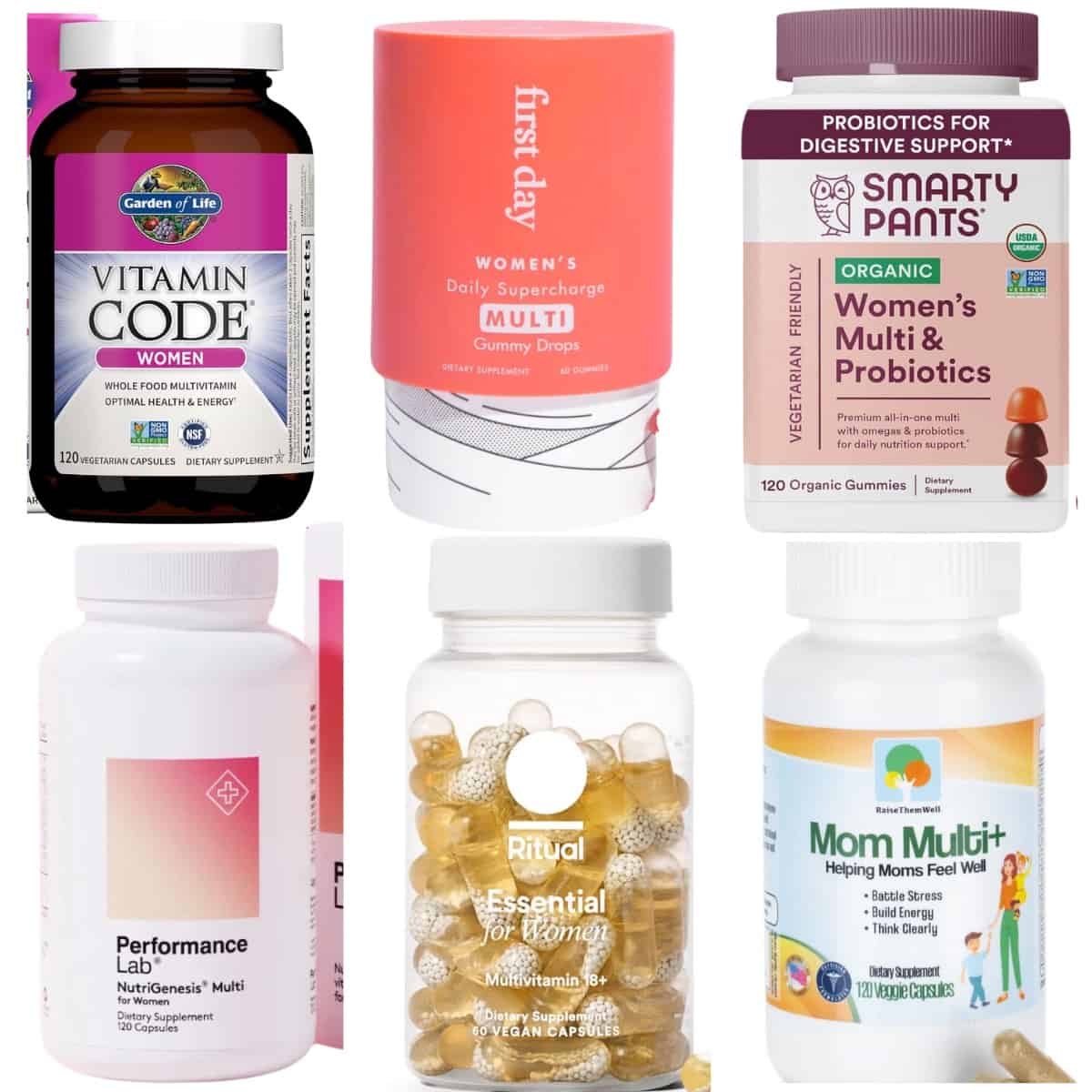
Shopping for women’s multivitamins can be confusing. Which are the most important ingredients to look for? Are certain forms of vitamins really better than others? Which brands are the best? Most importantly, do you even need to take a multivitamin?
Researching answers to these questions, sorting through the myriad of brands, and seeing which options have the criteria you need can be time-consuming and overwhelming.
That’s where my guide comes in. Working with a dietitian and my team, I researched the top multivitamins for women so you don’t have to! My team and I scoured the market high and low to determine which brands offer the most high-quality, comprehensive, and effective women’s multivitamins for every need and situation.
Below is the complete list of the best multivitamins for women, what to look for when shopping for vitamins, and common questions and answers about taking women’s multivitamins. Let’s dive in!
At A Glance: Best Multivitamins For Women
- Best Overall Women’s Vitamin: Ritual Essential Women’s Multivitamin
- Best Women’s Gummy Vitamin: First Day Women’s Daily Supercharge
- Best Women’s Multivitamin for Stress Support: Raise Them Well Mom Multi+
- Best Multivitamin for Women Over 50: Ritual Essential for Women Multivitamin 50+
- Best Vegan Multivitamin for Women: Performance Lab Women’s Multivitamin
- Best Multivitamin for Women of Color: Mela Vitamins
- Best Multivitamin with Probiotics: Vitamin Code Women
- Best One Daily Multivitamin: Naturelo One Daily Multivitamin for Women
- Best Multivitamin with Omega-3s: Smarty Pants Women’s Multi & Omegas
- Best Budget Women’s Multivitamin: Olly Women’s Multi
- Best Liquid Women’s Multivitamin: Passion 4 Life Multivitamin
- Best Organic Multivitamin: MyKind Organic Women’s Once Daily
- Best Whole Foods Based Women’s Multivitamin: Rainbow Light Women’s One Daily Multivitamin
- Best Fermented Women’s Vitamin: New Chapter One Daily Every Woman’s Multivitamin
- Best Women’s Multivitamin Without Iron: Hum Base Control Iron-Free
A Disclaimer & How I Chose The Best Women’s Multivitamin
As a board-certified health coach and certified nutritionist, I support supplements that are rooted in science and are evidence-based. The FDA does not review dietary supplements for safety and effectiveness before they go to market, so I prioritize products that are third-party tested and certified by one of three independent third-party certifiers (USP, NSF, or ConsumerLab.com). This guide has also been medically reviewed and fact-checked by Christina Badaracco, MPH, RDN, LDN. (see my about page for more info about Christina).
Though I may receive a commission (at no extra expense to you) if you purchase through some of the affiliate links provided, I only recommend products I’ve researched, evaluated, consulted experts on, and would feel comfortable taking or have taken myself.
As always, I only share products that are the highest quality and that can help you and your family the most. By purchasing any of these products from the links below, you help keep this blog running, so thanks for your support!
Large doses of vitamins can be harmful; you may benefit from individual vitamin supplements instead of a multivitamin. Always speak with your physician or dietician about your supplementation needs before adding a vitamin or similar supplement to your diet. (Note: supplementation doesn’t replace the need for a healthy, balanced diet, and you should aim to get our nutrition from food first, and then fill in the gaps with supplementation.)
The information shared in this post is not a substitute for professional medical advice, diagnosis, or treatment. Never disregard or delay in seeking professional medical advice because of something you read here and always consult with your doctor to determine the proper administration and recommended dosage of vitamins.
All product prices are accurate at the time of this publication but are subject to change.
Our Top 15 Best Women’s Multivitamins
Best Overall Women’s Vitamin: Ritual Essential for Women Multivitamin 18+
Ritual Vitamins is by far the best women’s multivitamin. They are one of the few clinically-backed multivitamins for women 18-49 formulated specifically to help fill the nutrient gaps in your diet. That is, in a clinical trial over 12 weeks, their Essential Multivitamin for Women increased vitamin D levels by 43% with no change for placebo; and increased Omega-3 DHA by 41% with no change for placebo (source).
If you are looking to see where the vitamins in your multivitamin are sourced from, Ritual is a great option for you. Their multivitamin is Made Traceable™, sharing the sources, suppliers, and manufacturing place, allowing you to see where the individual ingredients come from and why they chose the ones they did.
This brand is a great pick for vegan and vegetarian women. It is made with vitamin D derived from lichen and omega-3 fatty acids from microalgae, which are vegan-friendly sources of vitamin D. It is also Clean Label Project Certified (learn more here).
Ritual takes a food-first approach to its multivitamins, providing only the vitamins that would be missing from an already healthy and well-balanced diet.
If you are a picky eater who isn’t already eating a well-balanced diet, Ritual may not offer you all the supplementation that you need. If you’re pregnant or breastfeeding, they do have a prenatal vitamin option. And if you are a woman over 50 years of age, check out Ritual’s 50+ Multivitamin for their well-reviewed age-specific multivitamin.
Pros
Cons
Best Women’s Gummy Vitamin: First Day Women’s Daily Supercharge
If you are looking for the best gummy women’s vitamins, First Day Women’s Daily Supercharge Vitamins are my pick for the best option. They are made with organic fruits and veggies and are sweetened with tapioca syrup and organic cane sugar, giving them great flavor while still having only 2 grams of sugar per serving, and avoiding artificial sweeteners, colors, and flavors.
Though First Day women’s vitamins are specifically formulated to improve energy, they are a fantastic comprehensive vitamin for most adult women. These vitamins are made with bioavailable methylated folate and vitamin B12, vegan-friendly vitamin D, vitamin C, biotin, magnesium, and more.
First Day is the best gummy vitamin because it is made with pectin, not gelatin, making it vegan and vegetarian-friendly – whereas many other gummy vitamins do use gelatin. They are non-GMO, allergen-free, gluten-free, and are third-party tested. Order your first batch of vitamins on the First Day website and save 15% with their subscribe and save option. Shipping is always free and First Day offers a 45-day money-back guarantee.
Like Ritual, First Day’s vitamins are for people who already consume a well-rounded diet. They are made with only 9 vitamins in supplemental amounts – that is, often not 100% – and are not the best pick for anyone looking for a complete multivitamin with 100% Daily Values.
Pros
Cons
Best Women’s Multivitamin for Stress Support: Raise Them Well Mom Multi+
With 16 vitamins plus herbs, Raise Them Well Mom Multi+ is a physician-formulated complete multivitamin to fill nutrition gaps, support energy, improve cognition, and fight stress. While its branding is for moms, these vitamins are the perfect choice for any woman who wants an overall energy and wellness boost.
Raise Them Well Mom Multi+ is made with methylated B vitamins. They also contain selenium, zinc, vitamin D3, and vitamin C to support immune system function. Since this multivitamin has higher daily values and a more comprehensive selection of vitamins, this option is one of the best vitamins for women who are picky eaters or who can otherwise not consume a well-rounded diet. They also make a prenatal vitamin which is just as comprehensive as their Mom Multi+ vitamin!
Pros
Cons
Best Multivitamin for Women Over 50: Ritual Essential for Women Multivitamin 50+
Designed for the needs of post-menopausal women, Ritual Essential for Women Multivitamin 50+ is the best multivitamin for women over 50. It provides the necessary support for brain, bone, and heart health and supplementation for a healthy immune system and normal muscle function.
The main difference between this vitamin and Ritual Essential for Women Multivitamin 18+ is that the 50+ version has more magnesium, vitamin K2, vitamin B12, and vitamin E. These nutrients are in higher demand in the post-menopausal years. Ritual Essential 50+ also doesn’t contain iron and has less folate than the 18+ variety.
As with all of Ritual’s products, the brand has a fully transparent supply chain so you can see where the specific vitamins were sourced and why they included the ones that they did. These multivitamins are also vegan, vegetarian, gluten-free, and non-GMO.
Pros
Cons
Best Vegan Multivitamin for Women: Performance Lab Women’s Multivitamin
Performance Lab is an innovative supplement company that produces its vitamins using NutriGenesis®, a technology based on Nobel Prize-winning research that precisely duplicates the structure of naturally occurring nutrients, making it easier for the body to absorb them (source). Each multivitamin provides 20+ essential daily vitamins and minerals, such as probiotics, fiber, antioxidants, and digestive enzymes for maximal absorption.
This company grows all of its nutrients in a pristine lab, free of pollutants, contaminants, and pesticides, making it non-GMO and good for the environment.
This is certainly one of the best multivitamins for women, but it is particularly great for vegan women because of the absorbability of many ingredients that they don’t get in eating a plant-based diet. Many users support feeling increased energy, having stronger nails, and experiencing increased vitality and wellness within weeks of regularly taking them (sourced from customer reviews on their website).
The main drawback of Performance Lab is that they are rather expensive: almost $50 for a month’s supply of vitamins. However, they do have an ongoing buy 3 get 1 free offer, offering a discount of 25%, which makes them more affordable than some of the other options listed here.
Pros
Cons
Best Multivitamin for Women of Color: Mela Vitamins
The newest multivitamin offering on this list, Mela Vitamins are vitamins made by and for women of color. Since melanin affects how the body creates certain nutrients, such as vitamin D, founder Ashley Harmon created a vitamin specifically for women with melanated skin.
There’s so much to love about Mela. These vitamins are developed with science-based nutrients such as probiotics, adaptogens, a higher dosage of vitamin D3 than other multivitamins, and bioactive forms of essential vitamins A, C, E, B12, and B6.
Each 30-day supply of Mela vitamins runs $39.99, making it a more expensive option on this list, but the client reviews are exceptional. Users report lessened PMS symptoms, increased energy, improved digestion, clearer skin, a pleasant aftertaste, and more.
Pros
Cons
Best Multivitamin with Probiotics: Vitamin Code Women
Garden of Life’s Vitamin Code for Women is one of my favorite brands of supplements because of their dedication to clean, organic ingredients. So it should come as no surprise that I’ve included Vitamin Code on this list of the best multivitamins for women.
Made with probiotics from raw whole food sources and containing antioxidants and digestive enzymes, Vitamin Code supports women during their reproductive years. These multivitamins contain iron, methylated B vitamins, selenium, and more which support breast health, reproductive health, gut health, and heart health.
The main drawbacks of Vitamin Code are that the vitamins are on the costly side, the serving size is large, and the multivitamins do not contain iron. Still, they are one of my top vitamins for women and a great option if they fit in your budget.
Pros
Cons
Best One Daily Multivitamin: Naturelo One Daily Multivitamin for Women
If you’re looking for a complete multivitamin in just one capsule or pill per day, Naturelo One Daily Multivitamin for Women is for you! Each multivitamin contains 23 vitamins and minerals plus an organic fruit and vegetable blend. The vitamins provide B vitamins for energy and stress support; calcium, vitamin D, magnesium, and vitamin K2 for bone health; and vitamins A, C, E & zinc for a healthy immune system and aging support.
Another reason that I love Naturelo is that their multivitamins are plant-based. They are made with vitamin D from lichen, calcium and magnesium from marine algae, and iodine from kelp. Because of this, they are one of the best women’s multivitamins for vegans.
Finally, Naturelo is a fantastic pick because they are a budget-friendly option. Each $34.95 bottle contains 60 servings, making the approximate cost per month only $17.48.
Pros
Cons
Best Multivitamin with Omega-3s: Smarty Pants Women’s Multi & Omegas
For a multivitamin that contains essential fatty acids, I recommend Smarty Pants Women’s Multi & Omegas. These are some of the best women’s vitamins for a reason: they are made with up to 25% more vitamins than the leading women’s multi-gummy, contain omega-3 DHA and EPA for heart and brain health, and are made with bioavailable nutrients like methylated B vitamins and zinc citrate.
These multivitamins are comprehensive and contain significant daily values of 21 vitamins, making them a great vitamin for nutrition gaps as well as picky eaters. I also love Smarty Pants because they have great flavors, aren’t made with any artificial sweeteners, are commonly found in many grocery stores and major retailers, and are reasonably priced.
You can take Smarty Pants Women Multi & Omegas with or without food. They are gentle on digestion and don’t upset stomachs.
Pros
Cons
Best Budget Women’s Multivitamin: Olly Women’s Multi
Choose Olly Women’s Multi if you are looking for good vitamins for women while on a budget! Olly is $13.99 for a 45-day supply of vitamins, making them the lowest price option on this list.
Low price doesn’t mean low quality, however. Olly has much of what women of reproductive age need to thrive: vitamin C, vitamin C, B vitamins, Zinc, selenium, zinc, and more. They have a fantastic berry flavor and are made with only natural sweeteners.
The main drawbacks of Olly are that they don’t contain methylated B vitamins or folate, they are not vegetarian or vegan-friendly, and they are not certified to be non-GMO.
Pros
Cons
Best Liquid Vitamins for Women: Passion 4 Life Multivitamin
If you are looking for a high-quality liquid multivitamin for women, Passion 4 Life Multivitamin is for you! Though this product is not specifically formulated for women, it has everything that women need to thrive and has a high bioavailability, thanks to the liquid form.
This multivitamin is made with all-natural and high-potency whole food-based ingredients. Though it is formulated for adults it can also be taken by kids as well (check with your child’s pediatrician about dosing before using this for your child), making it a great option for the whole family.
The liquid vitamin has zero added sugar, no artificial flavors or colors, and it is vegan, non-GMO, and gluten-free. Every bottle you purchase also helps a child in need through their charity, Passion 4 Kids.
This is by far one of the best liquid vitamins for women and is a great idea for anyone who has trouble swallowing pills or just wants a high-quality bioavailable vitamin that’s super easy to take!
Pros
Cons
Best Organic Multivitamin: MyKind Organics Women’s Once Daily
Not only is MyKind Organics Women’s vitamin a USDA organic certified vitamin, but they are also another of the best daily vitamins for women! In just one tablet per day, these vitamins provide over 100% of the daily values of 15 vitamins in their most bioavailable forms.
There are no synthetic ingredients in these powerhouse tablets, either. They are made from real whole food ingredients, including vegan vitamin D3 and methylated B12 to support immunity and energy levels (source).
MyKind Organics is available for sale at many major retailers. They are moderately priced, vegan-friendly, non-GMO, and third-party tested. They also make a prenatal vitamin which is a great option for pregnant or breastfeeding women (I took their prenatal when I was pregnant with both of my kids). The only negatives about the multivitamin are that it is lower in iron and a few consumers report having an allergic reaction to it.
Pros
Cons
Best Whole Foods Based Women’s Multivitamin: Rainbow Light Women’s One Daily Multivitamin
If you think that whole foods-based vitamins are expensive by nature, you will be pleasantly surprised by Rainbow Light Women’s One Daily Multivitamin! I love how affordable these high-potency multivitamin tablets are: at $12.99 for a 30-day supply (plus 10% off with auto-delivery), they are one of the most budget-friendly options on this guide.
Each tablet is made with an organic superfood blend, probiotics, and herbs such as ashwagandha and black cohosh. Though some consumers report that the tablets are too large for comfortable ingestion, only one tablet is needed per day, making it a convenient option for filling any nutrient gaps you may have in your diet. Most of the 23 vitamins included in the multivitamin are at a 100% Daily Value or higher.
Rainbow Light also contains probiotics and digestive enzymes. Except for folate in the form of folic acid, the vitamins are included in their most bioavailable forms. Note: since the vitamins contain vitamin D derived from wool wax, these tablets are not vegan-friendly. They are a great option for vegetarians and meat eaters, however.
Pros
Cons
Best Fermented Women’s Vitamin: New Chapter One Daily Every Woman’s Multivitamin
Fermentation may make vitamins easier to digest (source 1, source 2). New Chapter creates some of the best fermented vitamins and their women’s multivitamin is no exception.
Made with fermented organic fruits and vegetables and superfoods like ginger, turmeric, and chamomile, this once-daily vitamin provides highly absorbable vitamins for immune, bone, and heart health as well as for stress and energy support.
New Chapter has an impressive product line of multivitamins, offering fermented vitamins for everyone, ranging from men’s and prenatal to kid’s and post-menopausal. They even offer a prenatal vitamin for women aged 35+ and the best multivitamin for women over 40: their Women’s Advanced 40+ multivitamin.
Pros
Cons
Best Women’s Multivitamin Without Iron: Hum Base Control Iron-Free
Though Hum Base Control Iron-Free is technically formulated for post-menopausal women, it is a great option for pre-menopausal women who need a multivitamin without iron (e.g. women with hemochromatosis – source – or women who already eat a lot of iron-rich foods). Each tablet contains more than 100% of the Daily Value of 14 micronutrients, making it a well-rounded nutrient-gap vitamin.
Hum multivitamins are formulated by registered dietitians and are made with verified clean ingredients. They are third-party tested for purity and quality and made without allergens, artificial ingredients, and animal products.
Because Hum is formulated for post-menopausal women it’s also one of the best multivitamins for women over 60. Unfortunately, some users report an unpleasant taste. These vitamins also don’t contain methylated B vitamins or folate but otherwise, these vitamins are a solid iron-free multivitamin option.
Pros
Cons
What Are Multivitamins?
Multivitamins are supplements that contain an array of vitamins, minerals, and occasionally other ingredients (source). They are also referred to as “multis” or even just “vitamins.” Multivitamins come in many different forms: tablets, liquids, gummies, chews, and even injectables.
Each of the vitamins in a multivitamin has a specific function or role in the body. For more information on which vitamins benefit the body in which way, see “What Are Common Nutrients in Women’s Multivitamins?” below.
Common additions to multivitamins are essential fatty acids (Omega-3s), probiotics or prebiotics, herbs, and more. Different brands of multivitamins formulate their supplements with varying levels of vitamins and minerals, provide different forms of vitamins, or make their vitamins from different sources, such as raw fruits and vegetables, lab-grown media, fermented foods, and synthetically produced ingredients.
The main role of multivitamins, or any supplementation, is to fill in any nutrition gaps in a person’s diet, especially diets that are limited or less well-rounded (e.g. people who eat a lot of fast food or processed food) and don’t contain enough diversity of fruits, vegetables, lean proteins and fish, dairy, healthy fats, and whole grains (source). People with certain genetic conditions, post-surgical patients, or various other specific groups may also benefit from a vitamin.
Anyone who doesn’t get the recommended dietary allowances of the individual vitamins and minerals, or has higher needs for certain nutrients, such as pregnant or lactating women, is at a higher risk for nutrient deficiency and should consider taking a multivitamin (source).
What Are The Benefits Of Multivitamins?
The most significant benefit of multivitamin supplementation is that it can help you get the nutrients that you may not be getting from your diet alone (source).
Recent studies have shown that multivitamins can help prevent cognitive decline among older adults (source), improve immune system function (source), support bone health (source 1, source 2), prevent iron deficiency anemia (source), and more.
How To Know If You Need A Multivitamin
Multivitamins can be beneficial for anyone who cannot otherwise consume a balanced and healthy diet or who has increased nutrient demands, such as the following (source):
- Pregnant Women: Fetuses need certain vitamins, such as folic acid, to develop properly. Additionally, pregnancy increases nutrient demands for vitamins and minerals, such as iron, making supplementation during pregnancy very important (source).
- Nursing Women: Though recent research has shown that not all nursing mothers need a multivitamin, many will want to talk with their doctor about continuing to take one, as there continues to be increased nutrient demand on a mother’s body during this time (source).
- Postmenopausal Women: Supplementation with certain vitamins can be very beneficial in maintaining bone health in postmenopausal women, especially those who have confirmed malabsorption issues (source).
- Confirmed Nutrient Deficiency: Whenever diet alone can not meet an individual’s recommended dietary allowances for vitamins and minerals, a multivitamin is always a good idea (source).
- On a Limited Diet: Whenever following a particular diet that limits consumption of a type of food, such as a vegan or vegetarian diet, following a low-calorie diet, or having a low appetite, it may be a good idea to discuss multivitamin or individual vitamin supplementation with your doctor, as plant-based diets and low-calorie diets can be low in vitamin B12, vitamin D3, iron, and zinc (source).
- Diagnosed Digestive Problems: Health conditions such as lactose intolerance, celiac disease, ulcerative colitis, pancreatitis, alcoholism, and more can interfere with how the body digests food, limiting proper nutrient absorption (source).
If any of these criteria apply to you, consider asking your doctor about multivitamin or individual vitamin supplementation. Note – this list is not exhaustive, so there may be other conditions where one might benefit from a multivitamin – ask your doctor for guidance if you’re considering a vitamin.
Who Should And Should Not Take Multivitamins?
Smart and healthy lifestyle choices, such as eating a well-balanced diet, exercising regularly, not smoking, getting enough sleep, and limiting stress are the best ways to optimize your overall health and should be honestly evaluated before considering multivitamin supplementation (source).
If you are doing all of these things, but meet any of the criteria in the section above – such as being vegan, pregnant or nursing, postmenopausal, and more – you will likely want to discuss supplementation with your healthcare provider.
Suppose you do not meet any of these criteria, but still want extra assurance that you are meeting all of your vitamin and mineral requirements. In that case, some experts argue that the risks of regularly taking a multivitamin are low (source). The option to take a multivitamin or not is a personal one and one that your physician should be able to help you with as well.
What Are Common Nutrients In Women’s Multivitamins?
Several key nutrients are particularly important for women’s health. When looking for a multivitamin these 10 key nutrients are good to keep an eye out for.
Vitamin D
Improves bone health, helps to boost the immune system, fights inflammation, improves mood, and helps with absorption of calcium (source). Vitamin D can be consumed or synthesized by our bodies when we’re exposed to sunlight; since most people don’t live in an area that gets enough sunlight to create our daily Vitamin D requirement, eating vitamin D-rich foods or supplementing with Vitamin D is important (source). Good food sources of vitamin D are fatty fish, egg yolks, dairy, mushrooms, and fortified cereals (source).
Magnesium
Helps reduce stress, improves sleep, balances blood sugar and blood pressure, and regulates muscle and nerve function (source). Magnesium can also aid in digestion (source). There are over 10 different forms of magnesium, and everyone reacts to each form differently (for example, magnesium citrate and oxide are the main forms that are sometimes considered laxatives – source). To determine the best form for you, speak with your doctor or a dietitian. To add more magnesium to your diet, consider pumpkin seeds, leafy greens, beans, soy milk or edamame, dairy products, avocados, and bananas (source).
Calcium
Women are more likely to develop osteoporosis than men are, making it an important mineral for people who were born female (source). The best way to ensure adequate calcium consumption is through the diet, so many of the supplements on this list are lower in calcium. Instead, focus on getting the bulk of your calcium needs satisfied through your diet: leafy greens, almonds, dairy, soybeans, beans, and more are all great sources of calcium (source). Note: any calcium supplement should be taken along with vitamin D (and possibly other nutrients like magnesium and phosphorus) for better absorption.
Iron
Iron is an essential nutrient for women aged 12-49, as these women are most likely to have an iron deficiency from losing blood during menstruation (source). There are many health benefits to iron: it helps create red blood cells which are crucial for oxygen transport within the body, supports hormone production, and more (source). Great food sources of iron include red meat, leafy green vegetables, dried fruit, nuts and seeds, and tofu (source).
Folate
Folate is one of the most important nutrients for pregnant women, as it helps to prevent major birth defects (source). Pregnant women need at least 400 mcg of folic acid daily (source), though researchers have found a connection between folate and cognitive function and heart health for women of all ages (source). Increase your folate consumption by eating dark leafy greens, beans, sunflower seeds, beans and legumes, eggs, and fortified foods (source). When it comes to B vitamins, some research has suggested that the methylated forms (e.g. methyl-folate vs. folic acid – source – or methylcobalamin vs. cyanocobalamin are more easily absorbed by the body).
Vitamin B12
This vitamin is an essential vitamin that your body needs but cannot create on its own. Vitamin B12 is used for DNA synthesis, red blood cell creation, and it also supports nerve function, making it very important to overall health and vitality (source). Vitamin B12 is most commonly found in animal or animal-derived food sources or fortified foods such as red meat, fish, poultry, dairy, shellfish, fortified cereals, and nutritional yeast (source).
People who eat a vegan or plant-based diet can be prone to vitamin B12 deficiencies (source), as so many of the best vitamin B12 sources are animal-based. If you follow such a diet, speak with your healthcare provider to determine if supplementation is necessary. Pregnant and nursing women also have elevated vitamin B12 needs (source).
Biotin
This B vitamin is most widely known for its ability to improve hair and nail health, biotin also helps metabolize food into energy, supports the nervous system, and is important for eye health (source, source). Common food sources of biotin are beef liver, eggs, salmon, sunflower seeds, sweet potatoes, almonds, broccoli, and dairy products (source).
Vitamin E
This vitamin supports eye health and vision, immune system function, skin health, brain function, and more (source). Vitamin E is an antioxidant that helps reduce inflammation in the body, playing a part in preventing and combatting oxidative stress, cancer, cataracts, and more (source). Sunflower seeds, peanut butter, red bell pepper, pumpkin, wheat germ oil, and leafy greens are all great sources of vitamin E (source).
Vitamin K
Usually a lesser-known nutrient, vitamin K plays an important role in blood clotting and bone development (source). There are two main types of vitamin K, one of which can be made by the body and the other which needs to be ingested or consumed (source). Great ways to increase your vitamin K consumption is by reaching for foods such as broccoli, cabbage, leafy greens, soybeans, brussels sprouts, bean sprouts, rhubarb, and avocado (source).
Vitamin A
This vitamin is an essential nutrient for immune system function, reproduction processes, healthy growth, and development (source). Dietary sources rich in vitamin A are fatty fish, organ meats, leafy green vegetables, apricots, mangos, dairy products, eggs, and fortified cereals, but there’s a slight difference in the forms of Vitamin A found in these foods. We find beta-carotene, a precursor to vitamin A, in plant-based foods, and preformed vitamin A in animal-based foods (source).
Vitamin C
When it comes to boosting the body’s immune system and healing process and forming body tissues such as blood vessels, cartilage, and muscle, vitamin C is a star player (source). The foods highest in vitamin C are citrus fruits, strawberries, peppers, broccoli, brussels sprouts, and potatoes (source).
Vitamin B6
Also known as pyridoxine, vitamin B6 is key in helping the body utilize and store energy from food and in forming hemoglobin the protein in red blood cells delivers oxygen to bodily tissues (source, source). To ensure you are getting adequate vitamin B6 from your diet, eat poultry, chickpeas, bananas, tuna, salmon, potatoes, cottage cheese, marinara sauce, and bulgur (source).
Omega-3 Fatty Acids
These healthy and essential fatty acids are likely to support heart and brain health, improve mood, reduce bodily inflammation, and more (source). Good sources of omega-3s are fatty fish, hemp seeds, chia seeds, soybean oil, and canola oil (source). If you don’t have many of these foods in your diet, it could be a good idea to discuss supplementation with your doctor.
Some of the multivitamins listed in this guide contain omega-3s, but not all. If the one you choose does not have them, consider taking an omega-3 single supplement, such as Nordic Naturals Ultimate Omega.
Additional Vitamins & Minerals
Multivitamins also often contain additional vitamins and minerals in varying amounts: thiamin, riboflavin, pantothenic acid, iodine, manganese, copper, selenium, and zinc.
What Should You Look For When Choosing A Multivitamin?
Unfortunately, multivitamins are not evaluated or approved by the Food and Drug Administration (FDA), so there are a few important factors to look for when shopping for vitamins. They are:
- Third-Party Testing: This means that an independent organization, such as NSF, USP, or ConsumerLab.com, has tested and reviewed the vitamins for purity, safety, quality, product labeling accuracy, and performance (source).
- Non-GMO: Genetically modified ingredients, or GMOs, are considered to be best to avoid, if not harmful, for good health (source). GMOs can be resistant to certain antibiotics, potentially contributing to antibiotic resistance overall (source).
- Bioavailable Forms of Vitamins: Bioavailability is how easily the body can absorb and use a nutrient (source). There are many factors that can affect this, such as competition with other nutrients, stress, and the chemical form of the nutrient. When it comes to women’s multivitamins, look for the following bioavailable forms: vitamin B12 (goal form: Methylcobalamin), folate (goal form: L-methylfolate), and vitamin D3 (goal form: cholecalciferol; source).
Ingredients To Avoid
When it comes to vitamins, there are a handful of less-than-ideal ingredients. Here is what to watch out for:
- Artificial Ingredients: The jury is out on whether or not artificial ingredients are harmful to the body (source). However, it’s never a bad idea to avoid any artificial ingredients such as flavors, sweeteners, or colors by choosing a vitamin with natural ingredients instead. Common artificial sweeteners are aspartame, sorbitol, xylitol, and mannitol. If sweeteners are unavoidable, choose natural sweeteners such as cane sugar, glucose syrup, or monk fruit instead.
- Carrageenan: Though this derivative of seaweed is approved for consumption and use by the FDA, many scientists believe that it is best to avoid it. They believe that carrageenan can create inflammation in the digestive system and may even be connected to colon cancer (source).
- Food Dyes: Studies show that all of the US-approved food dyes (FD&C Red #40 Lake, FD&C Blue #2 Lake, FD&C Yellow #6 Lake) pose health concerns in some form. Many of the dyes have carcinogenic properties and others are known to create hypersensitivity reactions (source).
FAQs
There are many great brands of multivitamins for women currently on the market. Depending on your goals, budget, and the vitamin form that you prefer, Ritual, First Day, Performance Lab, Rainbow Light, New Chapter, and Garden of Life make some of the highest-quality women’s multivitamins.
Though the answer can vary based on your doctor and the conditions you may have that they are treating you for, most doctors and dietitians recommend eating a balanced and healthy diet before taking a multivitamin (source). If you have any issues that inhibit your body’s ability to absorb nutrients, are pregnant, can’t otherwise consume a balanced diet, or have any of the other issues mentioned above, ask your medical team about the best women’s multivitamin recommended by doctors for your unique situation.
For people who are unable to attain their daily nutrient requirements through diet alone, multivitamins can be a good option. Medical experts warn that multivitamins cannot replace a healthy diet and also caution against ingesting over the daily recommended amounts of certain vitamins, as they can be toxic in large quantities (source).
Though you will always want to consult your doctor before taking vitamin D with a multivitamin, experts say that you can take the two supplements together if your total intake from both doesn’t exceed 100mcg per day (source).
The best time of day to take a multivitamin is the time of day that you will consistently remember to take it. For many, this is with their morning meal or right before going to bed. For particular dosage instructions, always refer to your particular multivitamin’s directions. Some vitamins are better taken at certain times of the day or with meals or liquids.
In general, vitamins are considered to be safe (source). Since the FDA does not approve or regulate supplements, however, always choose a multivitamin that has been third-party tested. Furthermore, if you are on any medications always consult your physician or dietitian before starting a supplement as some supplements can interact with medications (source).
If you have been directed by your doctor to take a multivitamin, you will want to follow the dosage instructions listed on the multivitamin that they recommend. For most multivitamins, this means taking the vitamins every day.
Final Thoughts
I hope that this list of the best vitamins for women helped you find a great vitamin that meets all of your needs. Whether you are looking for a supplement with probiotics or omega-3s or a vegan-friendly supplement that doesn’t come in pill form, there is sure to be a high-quality option for you.
All of the vitamins on this list provide key essential nutrients that most women need, so taking one of these high-quality vitamins can be beneficial for your health. Always be sure to consult your doctor or dietitian before starting any supplement program, as they will be able to guide you to the best option for you.







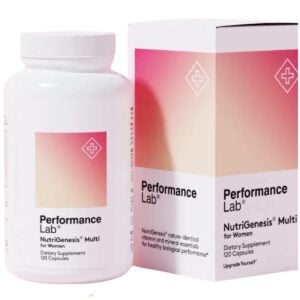
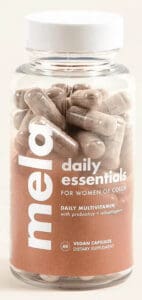

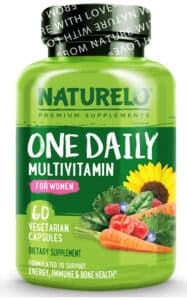







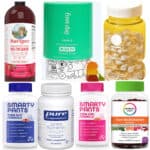

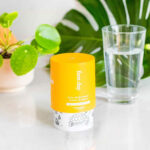





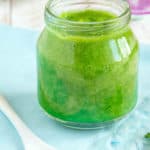


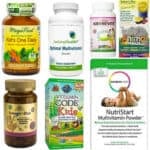
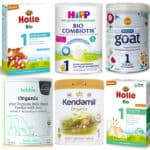



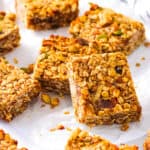







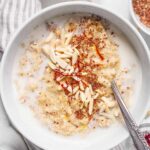



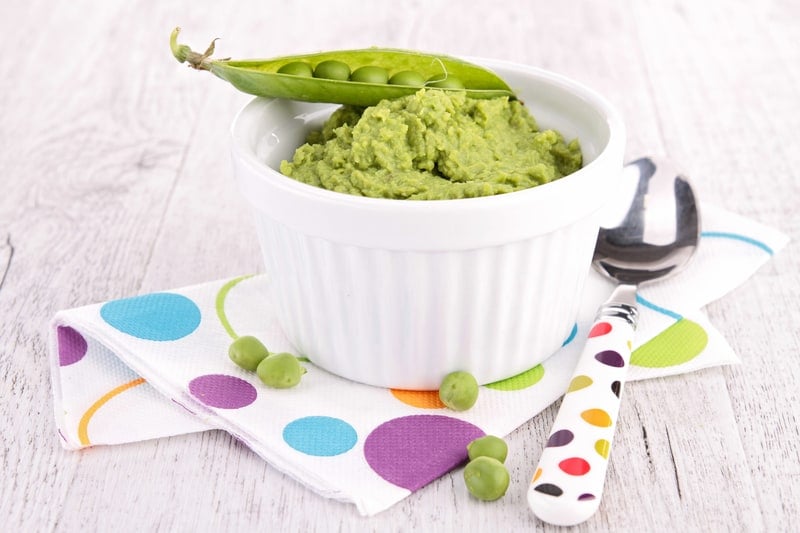
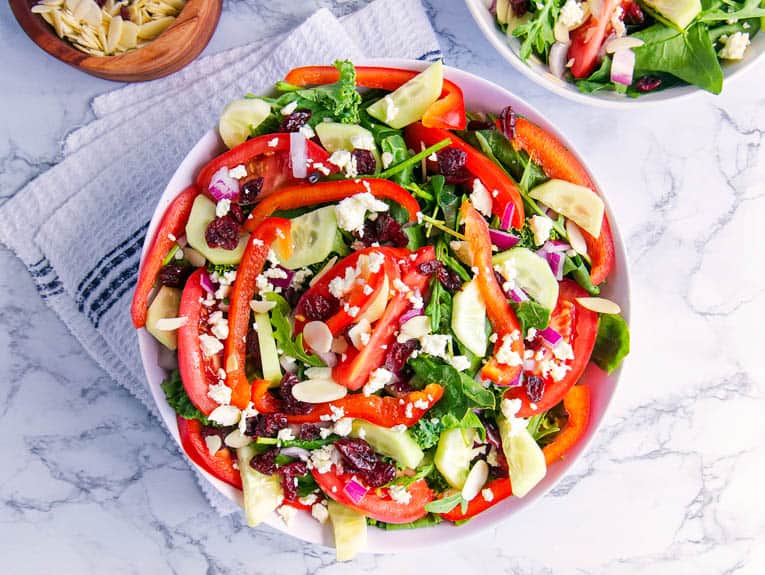


Best drugstore multivitamin for 37 year old man?
I like Garden of Life Men’s One a Day!
Hello, what brand do you recommend for Magnesium Bisglycinate with no gel capsules, I’ve heard that it is bad for the gut, and Maringa powder there’s so many to choose from. Thank you!
Hi Maribel! I actually haven’t found a good Magnesium Bisglycinate with no gel capsules, so sorry about that! For Moringa powder – I would pick any brand that is organic, and only has one ingredient: Organic Moringa Powder. Hope that helps!
Hello Anjali,
Do you have a recommendation on an iron supplement to increase my ferritin and iron saturation rate? I currently use natures made daily but the saturation rate is not increasing. Thank you!
Sejal
Hi Sejal! Here are some options:
1) You can try this heme iron supplement which is supposed to be better for increasing ferritin
2) You can try this iron supplement from Thorne Research
3) If you want a chewable version, I would actually recommend trying this chewable iron supplement from Hiya — it’s made with carbonyl iron which is highly absorbable and contains a specific form of Vitamin C to further help absorption. Since it’s a kids chewable tablet, you can adjust the dosing as your doctor sees fit (you can tell your doctor that 1 tablet has 7mg iron, and ask them how much iron you should take daily).
Hope that helps!
Hello Anjali, can you tell me which brand of Moringa and Tumeric is best in you opinion? Thanks, Maribel 🙂
Hi Maribel! I like this brand of organic turmeric, and another brand I really like for turmeric is Truvani. For moringa, I like this brand, but I typically recommend it as a lactation supplement than a general supplement. As with any supplement, don’t start taking any of these options without talking to your doctor (and getting their approval) first! I hope that helps!
Hello, Anjali once I start taking the Moringa and Tumeric can I also take a multivitamin 50 + ? I don’t need a lactation Moringa, which other brand can you recommend , thank you🙂
Hi Maribel! There isn’t any “double dosing” issues between Moringa, Turmeric and the multivitamin 50+ so theoretically there shouldn’t be any issues taking all of them together. But make sure to check with your doctor before adding any supplements into your normal routine just to be sure! For a non-lactation Moringa supplement, I like this brand: Simple Life Organic Moringa. It’s organic, vegan, and isn’t lactation specific. Hope that helps!
Hello Anjali
Super informative- thank you so much!!
I need to increase my iron and vitamin b12 levels. I am also 46 years old.
Which one would you recommend pls?
Hi! I’d recommend the Garden Of Life Prenatal (3 per day) – it’s high in iron and B12 and contains a variety of nutrients that are beneficial even if you’re not trying to get pregnant! Just make sure your primary care doctor agrees with my recommendation before you start taking them. Hope that helps!
Thank you for this guide! What do you think about getting your multivitamins from sources like athletic greens vs a pill supplement? Also, what is your opinion about ritual and it not being as comprehensive as other vitamins? I really like ritual for the reasons you mention above, but even though I eat a pretty good diet, who knows if I need more than what it gives me…
Thanks for your input!
Hi Komal! Thanks for reaching out! You can certainly get your vitamins from a source like a greens powder instead of a pill supplement – as long as you’re able to use the greens powder on a daily basis, and the greens powder has a combination of multivitamins, you should be fine. For Ritual – it really is meant to be a food-gap supplement – so if you’re eating a really well balanced diet (good sources of protein and whole grains, lots of fruits and veggies), and you’re not deficient in any critical vitamins (like iron/ferritin or Vitamin D – based on blood tests) – you should be fine to use Ritual. Hope that helps!
What do you recommend for women with Mthfr gene mutation double copy. Also is copper in vitamins a good thing?
Hi Shana! If you have both copies of the MTHFR mutation, you should consult your doctor on which multivitamin is the best for you. You’ll need methylated B vitamins, but even the amounts of the B vitamins can vary depending on how severe your mutation is. Regarding copper in vitamins, copper is an essential mineral that we all need, but depending on your diet you may already be getting enough copper from your diet itself. So I’d say copper is mostly helpful in vitamins for people that aren’t eating copper rich foods.
Hello! I am looking for a good high quality multivitamin that doesn’t contain iron. I already take extra vitamin c, d, and zinc supplements daily. I just need a good multivitamin to add to my regimen. Looking for something for me and my husband. Thanks so much!
Hi Kimberly! I’d recommend Thorne– it’s a super high quality multivitamin, very comprehensive, and doesn’t contain iron! Hope that helps!
Hi, what do you recommend I am 40 have low metabolism, anemia ( I would like a good individual iron supplements) and high estrogen.
Hi Jyoti! I would probably recommend Ritual for a multivitamin, and this liquid iron supplement from Gaia. Hope that helps!
What about vitafusion for women the gummies
Hi Lacy! They’re ok but they have 3 grams of sugar per serving, they contain gelatin (so they’re not vegetarian friendly), and they don’t have the best forms of each vitamin (e.g. the vitamin forms they contain aren’t as easily absorbed by the body). I’d recommend one of the other vitamins on my list instead!
Hello is there a vitamin comparable to the mykind garden of life women’s 55 plus?
I purchased twice but now can no longer locate and need to find something else
Hi Julie! Yes! I’d recommend Ritual for Women 50+ – it’s a super high quality vitamin comparable to Garden of Life. Hope that helps!
Hi Anjali,
Which brand do you recommend for a B12 or B Complex for adults?
Thanks,
Tina
Hi Tina! I like Thorne Basic B! It contains all of the active forms of B vitamins for maximum absorption!
My doctor recommended for me to take Vit C and Zinc, what brand would recommend? Thank you
Hi Mari! I’d actually recommend using the Garden of Life Prenatal which includes a healthy dose of both Vitamin C and Zinc! If you need an extra dose of Vitamin C, I’d recommend Liposomal Vitamin C. Hope that helps!